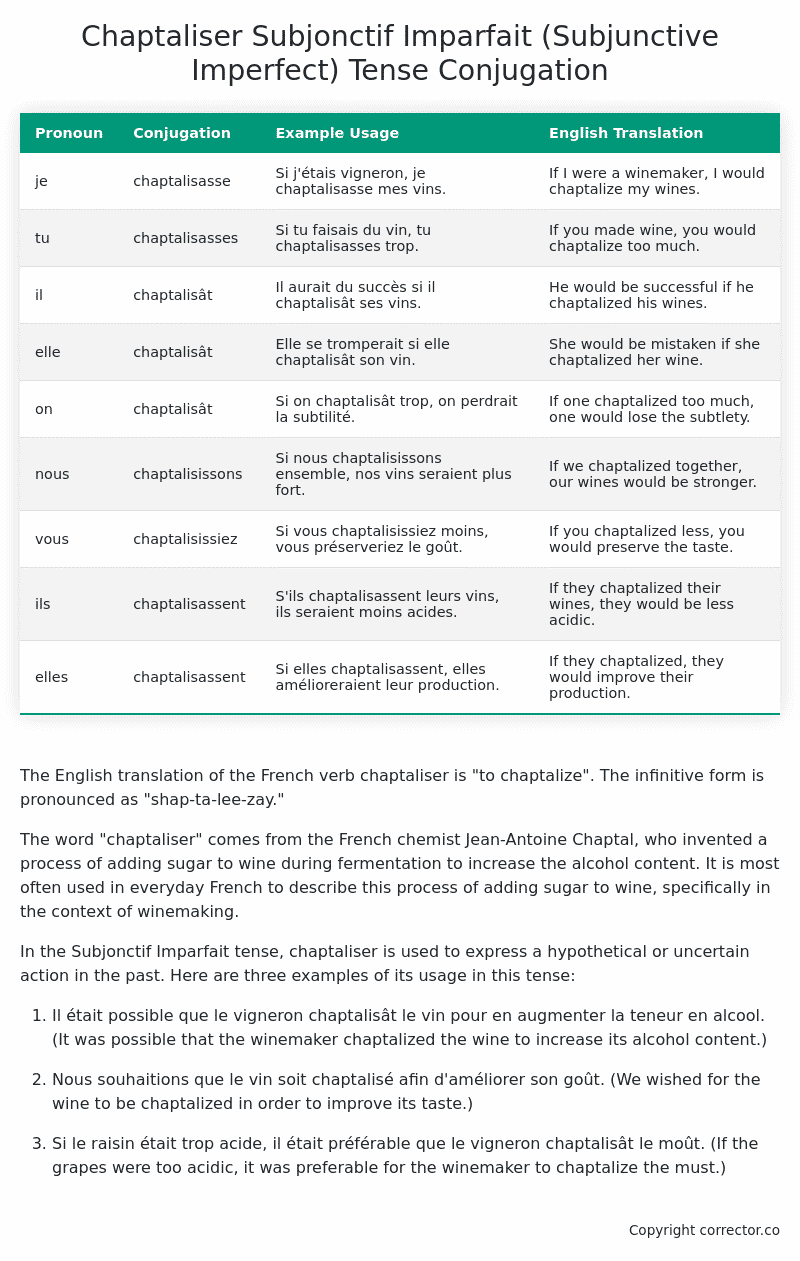Subjonctif Imparfait (Subjunctive Imperfect) Tense Conjugation of the French Verb chaptaliser
Introduction to the verb chaptaliser
The English translation of the French verb chaptaliser is “to chaptalize”. The infinitive form is pronounced as “shap-ta-lee-zay.”
The word “chaptaliser” comes from the French chemist Jean-Antoine Chaptal, who invented a process of adding sugar to wine during fermentation to increase the alcohol content. It is most often used in everyday French to describe this process of adding sugar to wine, specifically in the context of winemaking.
In the Subjonctif Imparfait tense, chaptaliser is used to express a hypothetical or uncertain action in the past. Here are three examples of its usage in this tense:
-
Il était possible que le vigneron chaptalisât le vin pour en augmenter la teneur en alcool. (It was possible that the winemaker chaptalized the wine to increase its alcohol content.)
-
Nous souhaitions que le vin soit chaptalisé afin d’améliorer son goût. (We wished for the wine to be chaptalized in order to improve its taste.)
-
Si le raisin était trop acide, il était préférable que le vigneron chaptalisât le moût. (If the grapes were too acidic, it was preferable for the winemaker to chaptalize the must.)
Table of the Subjonctif Imparfait (Subjunctive Imperfect) Tense Conjugation of chaptaliser
| Pronoun | Conjugation | Example Usage | English Translation |
|---|---|---|---|
| je | chaptalisasse | Si j’étais vigneron, je chaptalisasse mes vins. | If I were a winemaker, I would chaptalize my wines. |
| tu | chaptalisasses | Si tu faisais du vin, tu chaptalisasses trop. | If you made wine, you would chaptalize too much. |
| il | chaptalisât | Il aurait du succès si il chaptalisât ses vins. | He would be successful if he chaptalized his wines. |
| elle | chaptalisât | Elle se tromperait si elle chaptalisât son vin. | She would be mistaken if she chaptalized her wine. |
| on | chaptalisât | Si on chaptalisât trop, on perdrait la subtilité. | If one chaptalized too much, one would lose the subtlety. |
| nous | chaptalisissons | Si nous chaptalisissons ensemble, nos vins seraient plus fort. | If we chaptalized together, our wines would be stronger. |
| vous | chaptalisissiez | Si vous chaptalisissiez moins, vous préserveriez le goût. | If you chaptalized less, you would preserve the taste. |
| ils | chaptalisassent | S’ils chaptalisassent leurs vins, ils seraient moins acides. | If they chaptalized their wines, they would be less acidic. |
| elles | chaptalisassent | Si elles chaptalisassent, elles amélioreraient leur production. | If they chaptalized, they would improve their production. |
Other Conjugations for Chaptaliser.
Le Present (Present Tense) Conjugation of the French Verb chaptaliser
Imparfait (Imperfect) Tense Conjugation of the French Verb chaptaliser
Passé Simple (Simple Past) Tense Conjugation of the French Verb chaptaliser
Passé Composé (Present Perfect) Tense Conjugation of the French Verb chaptaliser
Futur Simple (Simple Future) Tense Conjugation of the French Verb chaptaliser
Futur Proche (Near Future) Tense Conjugation of the French Verb chaptaliser
Plus-que-parfait (Pluperfect) Tense Conjugation of the French Verb chaptaliser
Passé Antérieur (Past Anterior) Tense Conjugation of the French Verb chaptaliser
Futur Antérieur (Future Anterior) Tense Conjugation of the French Verb chaptaliser
Subjonctif Présent (Subjunctive Present) Tense Conjugation of the French Verb chaptaliser
Subjonctif Passé (Subjunctive Past) Tense Conjugation of the French Verb chaptaliser
Subjonctif Imparfait (Subjunctive Imperfect) Tense Conjugation of the French Verb chaptaliser (this article)
Conditionnel Présent (Conditional Present) Tense Conjugation of the French Verb chaptaliser
Conditionnel Passé (Conditional Past) Tense Conjugation of the French Verb chaptaliser
L’impératif Présent (Imperative Present) Tense Conjugation of the French Verb chaptaliser
L’infinitif Présent (Infinitive Present) Tense Conjugation of the French Verb chaptaliser
Struggling with French verbs or the language in general? Why not use our free French Grammar Checker – no registration required!
Get a FREE Download Study Sheet of this Conjugation 🔥
Simply right click the image below, click “save image” and get your free reference for the chaptaliser Subjonctif Imparfait tense conjugation!

Chaptaliser – About the French Subjonctif Imparfait (Subjunctive Imperfect) Tense
Formation
Common Everyday Usage Patterns
Interactions with Other Tenses
Subjonctif Présent
Indicatif Passé Composé
Conditional
Conditional Perfect
Summary
I hope you enjoyed this article on the verb chaptaliser. Still in a learning mood? Check out another TOTALLY random French verb conjugation!


